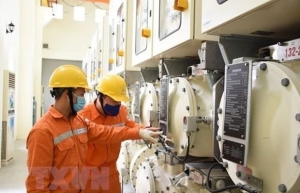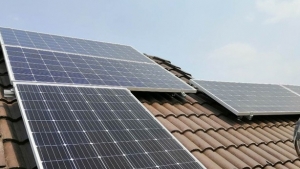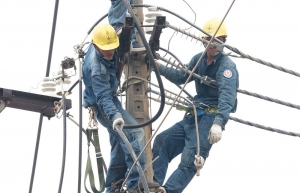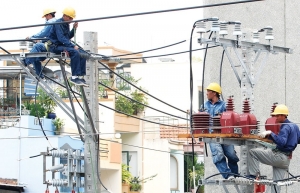Pricing band to influence power tariffs across Vietnam
 |
| The government may examine and test electricity pricing adjustments every six months, photo Le Toan |
The Ministry of Industry and Trade (MoIT) will determine the average retail power price hike for this year based on the implementation of the new average retail electricity pricing bracket beginning on February 3.
Officially implemented by the MoIT, the minimum average retail energy price bracket (excluding VAT) is 7 US cents per kWh and the highest price is 10 US cents per kWh. Hence, compared to the previous frame rate, the lowest price rose by 0.9 US cents per kWh, while the maximum price climbed by 2.3 US cents per kWh.
A week ago, Tran Viet Hoa, director of the MoIT’s Electricity Regulatory Authority of Vietnam, stated that the adaptation of the average retail cost of electricity has not directly altered the retail power prices for daily life and business but is the premise for EVN’s plans to modify the retail electricity price.
“The government has promulgated the average retail price bracket for electricity since the cost range of the average total retail price of electricity is no longer sufficient,” Hoa said. “We have not yet mirrored the volatility of model parameters to the cost of electricity production and business, particularly the fluctuation in fuel price.”
Production costs grow, yet as of 2022, Electricity of Vietnam (EVN) had not increased its power pricing. As of the end of 2021, the price of imported coal for power plants began to rise, and coal-fired power now accounts for around 40 per cent of EVN’s energy output, production, and business expenses.
In addition, the exchange rate disparities recognised in the power purchase agreement for 2019-2024 are expected to be exceeding $889 million, which must be allocated and included in the yearly cost of energy generation.
“Based on the aforementioned average retail power price, the authority will determine the modification level within the average retail electricity price range,” Hoa said.
Two weeks ago, the MoIT delivered a paper demanding EVN promptly come up with a strategy for the average retail price of energy in 2023 and design a roadmap and an acceptable degree of adjustment if it is required to modify the price rise.
Do Thang Hai, Deputy Minister of the MoIT, stated on February 2, “The adjustment of electricity prices will be measured, assessed, and thoroughly considered, as it affects inflation, people’s lives, the production and business activities of enterprises, and the macroeconomic monitoring of the government.”
Two months ago, EVN had proposed to the MoIT to “raise the average retail price of electricity” in order to alleviate difficulties, balance the financial situation in 2023, and implement the market mechanism for electricity.
Nguyen Tai Anh, deputy general director of EVN, said its record loss of $1.33 billion puts a strain on the electrical industry’s financial status. The cause of the huge loss last year was the steep rise in input parameters (imported coal price, blended coal price, gas price, and global oil price) and the increased cost of purchasing electricity when power plants entered the electricity market.
EVN also forecasts that the financial outlook for 2023 would worsen if power prices remained unchanged. Consequently, power firms and National Power Transmission Corporation anticipate a production and commercial loss of around $2.75 billion.
Numerous analysts opined that the amount and timing of the rise in power rates must be carefully considered so as not to compromise the 2023 socioeconomic development goals established by the National Assembly.
Vice chairman of the Vietnam Electrical Engineering Association, Tran Dinh Long, said changing power tariffs now is fair. He specifically underlined that by evaluating when and how much is acceptable to maintain macro-balance, the power business does not incur losses and assures the endurance of energy users.
“We should assess how much it costs to create 1 kWh of power currently, compared to the prior average price,” argued Long. “Furthermore, the authorities must be responsible and accountable for the growth in the number of permits they issue.”
According to him, the government may examine and test electricity pricing adjustments every six months. The existing approach to modifying power pricing has created challenges for the electrical business. “Typically, power rates are updated every 2-3 years. However, when input costs grow, electricity prices are altered significantly, causing hardship for energy consumers,” Long said.
| Nguyen Hong Dien - Minister of Industry and Trade | |
Currently, in certain central and southeastern areas, the source is huge, the load is quite low, and in some locations it only fulfils 4-5 per cent of the source capacity. In the meanwhile, the anticipated energy demand is enormous, and the likelihood of a power deficit in the next few years is evident. If transmission investments are not made immediately, the present capacity cannot be discharged, and the private sector will not be enticed to invest in the source in order to enhance the power source for the future. If the energy law is not updated on time, the pressure to release capacity and meet the nation’s electrical needs will be extremely high. | |
| Prof. Dr. Tran Dinh Long - Vice president Vietnam Electrical Engineering Association | |
Above 220KV, the state should continue to regulate the power systems. With a grid of 110KV or less, if the project is located far from the connection point, an investor may negotiate with EVN to construct a line segment from the plant to the connection point in order to assure initiative. This is to maintain the safety and security of the nation’s power grid, avoiding unwarranted risks. | |
| Ngo Thi To Nhien - Executive director Vietnam Initiative for Energy Transition | |
Currently, transmission costs are computed on an annual basis, fluctuating based on the yearly power production. In recent years, however, the lower the transmission cost, the greater the production, but only by 4.6 per cent. It is 45 per cent in Australia, and 25 per cent in both Germany and the United Kingdom. In addition, the existing law needs to more precisely define the extent and manner of investment by non-state economic sectors. Only then can the practicality and alignment of all parties’ interests be assured, while also preserving the security of the national electricity grid. |
 | Enterprises wary over EVN proposal Already tormented by a multitude of woes, many enterprises in industrial production could encounter greater pressure if Electricity of Vietnam’s proposal to raise the selling prices of power becomes true. |
 | Rooftop solar energy lacks legal foundation Businesses that intend to deploy rooftop solar energy for their own use must await a seamless link to the national energy grid. |
 | Power price hike on the cards in Vietnam Despite Electricity of Vietnam’s (EVN) intention to increase energy rates to rebalance its budget for 2023, the status of coal-fired power does not yet seem to be declining. |
 | Fresh approaches sought for electricity transmission The plan to raise transmission tariffs for energy indicates that Vietnam must take further steps to alleviate system stress and entice private sector investment in transmission. |
What the stars mean:
★ Poor ★ ★ Promising ★★★ Good ★★★★ Very good ★★★★★ Exceptional
Related Contents
Latest News
More News
- Trung Nam-Sideros River consortium wins bid for LNG venture (January 30, 2026 | 11:16)
- Vietnam moves towards market-based fuel management with E10 rollout (January 30, 2026 | 11:10)
- Envision Energy, REE Group partner on 128MW wind projects (January 30, 2026 | 10:58)
- Vingroup consults on carbon credits for electric vehicle charging network (January 28, 2026 | 11:04)
- Bac Ai Pumped Storage Hydropower Plant to enter peak construction phase (January 27, 2026 | 08:00)
- ASEAN could scale up sustainable aviation fuel by 2050 (January 24, 2026 | 10:19)
- 64,000 hectares of sea allocated for offshore wind surveys (January 22, 2026 | 20:23)
- EVN secures financing for Quang Trach II LNG power plant (January 17, 2026 | 15:55)
- PC1 teams up with DENZAI on regional wind projects (January 16, 2026 | 21:18)
- Innovation and ESG practices drive green transition in the digital era (January 16, 2026 | 16:51)




 Tag:
Tag:




















 Mobile Version
Mobile Version